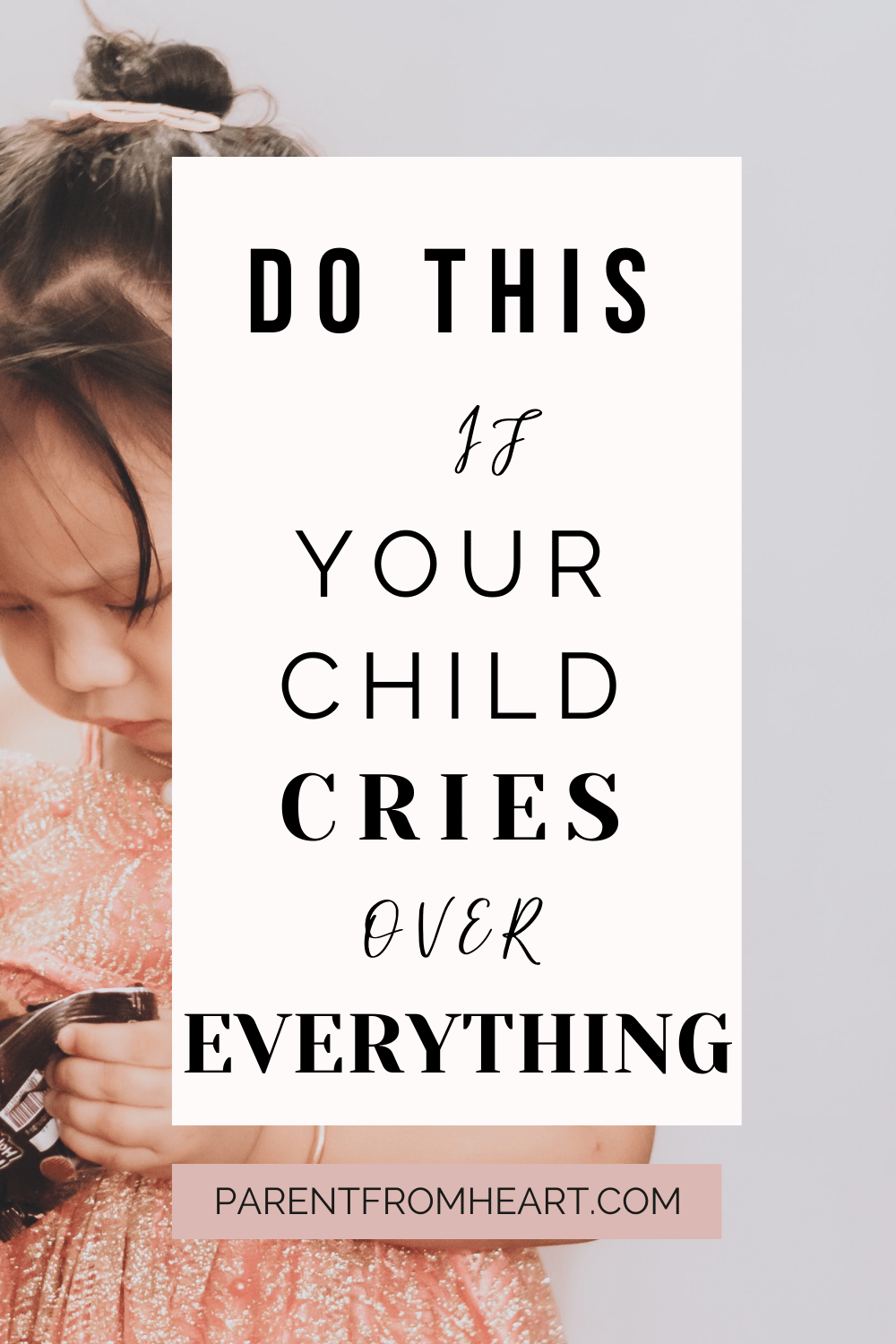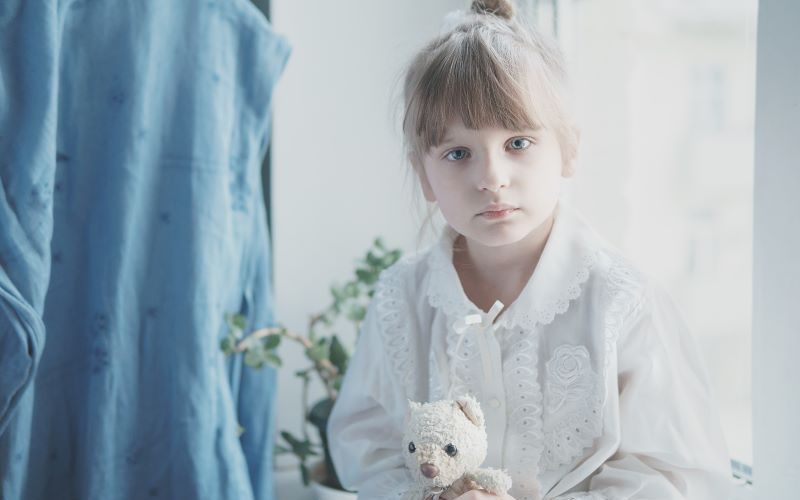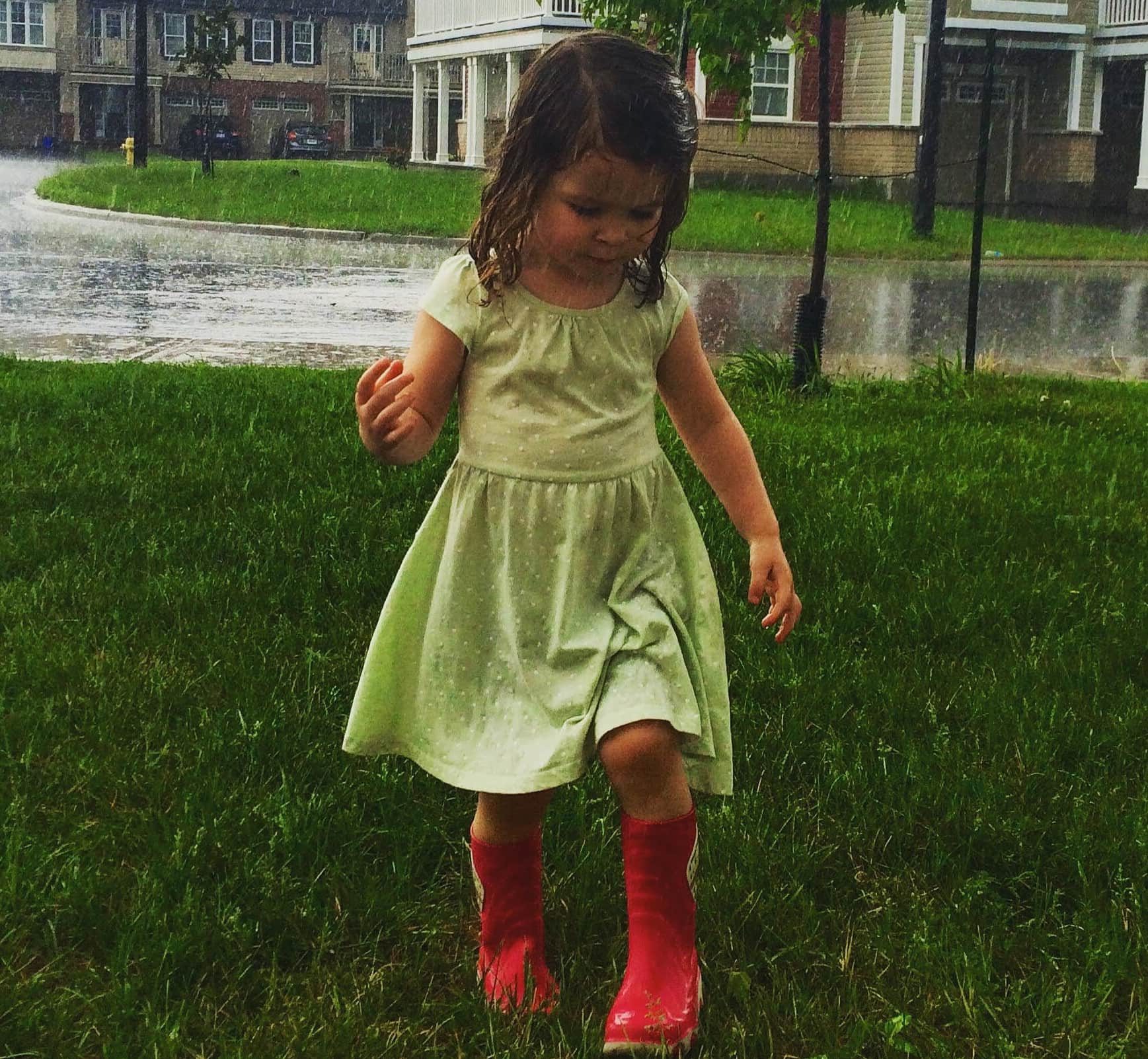Table of Contents
Does your child cry all the time? Do you feel like your child overreacts to everything?
If so, you’re not alone. Wondering how to deal with a child that cries over everything is something that parents worldwide experience. I have a child who spent the first four years of his life screaming, and now his older brother regularly turns on the waterworks.
I get it. It’s hard. If your kids’ crying triggers intense emotions in you, that just means you are human. But it can help to reframe your kids’ crying because it’s often a way of expressing internal dysregulation. That’s probably not what you want to hear because that means you have to figure out what’s happening in that little brain.
But crying is a biological mechanism that your kids have been using since birth to communicate with you. As a baby, it was stressful but understandable. As a toddler, it is overwhelming but developmentally appropriate. But as an older child? It’s just plain frustrating. Unfortunately, our frustration can stop us from seeing the genuine needs of our kids as they struggle to deal with complex emotions.
Why Is Your Child Always Crying?
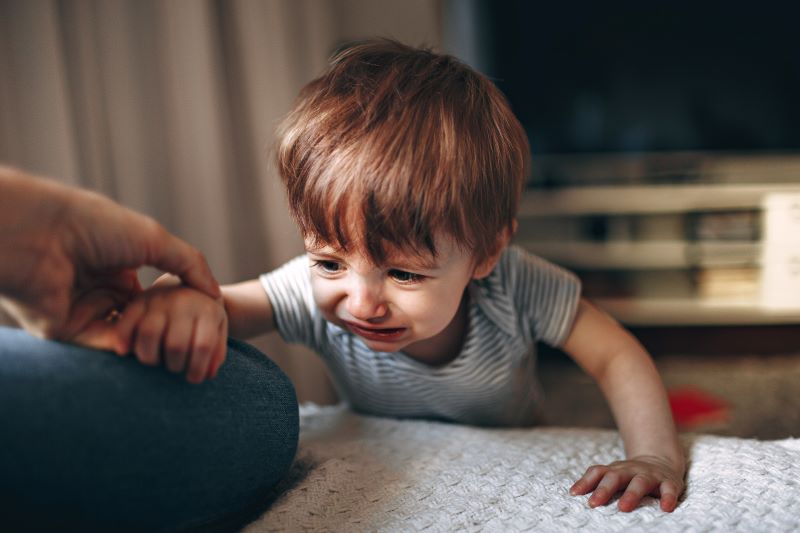
I had a crying child for most of my early mothering years, and boy, did it take its toll. In my exhausted, overwhelmed, and overstimulated state, I trawled the internet for anything that would help. I found that most young kids cry when they are hungry, tired, overstimulated, frustrated, or angry.
It was super helpful to have some “crying categories” I could go through to figure out why my child was crying.
Crying to Communicate
Small kids have limited verbal skills and vocabulary, so crying is an effective communication strategy.
It’s one of the most basic forms of communication, and one kids can use to quickly get your attention. If your baby is in pain or discomfort, they will cry to let you know about it. Tired and overstimulated kids also resort to crying because they may have no other way of expressing the conflicting and overwhelming feelings they are experiencing.
Crying also improves attachment and bonding. When your baby child cries, you usually pull them close or pick them up. Children look for that closeness and connection with you because it makes them feel secure. Every time you respond to your child’s crying, you reinforce and strengthen your attachment.
Development Stage
Young kids don’t have the emotional vocabulary, cognitive skills, and emotional regulation skills needed to use other communication methods apart from crying.
Kids need to understand and recognize emotions to articulate them. But before they have these skills, crying and other non-verbal cues are the only way they can express themselves. How we respond to their non-verbal cues helps them develop emotional regulation and learn how to express their emotions appropriately.
Frustration, boredom, and unease can be difficult emotions to pinpoint. Crying is an effective ‘blanket approach” kids can use because regardless of what emotions they are experiencing, you will respond to them.
Emotional development is a gradual process, and until your child has reached the stage where they can articulate themselves, crying is a sign they need help regulating.
Attention
How often have you heard people say, “Oh, they’re just crying for attention”?
But that’s precisely the point!
When your baby cries, you pick them up and comfort them. Your response teaches them that crying elicits a reaction. Yet, when older kids cry, we label their tears as “attention-seeking” behavior with a negative connotation. But kids can’t always distinguish between wants and needs. They also struggle with the concept of time. Not to mention that their emotional regulation center is immature.
So how, then, can we expect them to control their outbursts and reactions when they literally don’t have the cognitive capabilities? Seems a bit unfair, don’t you think?
Now, older kids may use tears and tantrums as a form of manipulation. I hate to tell you this, but when kids use tears to get their way, it’s also a learned behavior. Just like babies learn they will be picked up when they cry, older kids learn they can use the waterworks to wear you down.
Boundaries Are The Answer
If your kid crying to get attention is common, boundaries are the answer.
Firm, fair, and consistent boundaries followed by logical consequences can help your child learn emotional regulation.
For example, my kids love watching Minecraft videos on YouTube. But when I would say “no” to videos, my son would cry and whine until I eventually gave in. Quickly, I realized that the problem in this scenario was me. I sent mixed signals so my son would push his luck, hoping to get his way.
I don’t like them spending time on YouTube, but I also understand how important it is for them. So, we had a family meeting to discuss the situation. I explained that I don’t like YouTube and why it isn’t a safe space for them to use. But I also explained that I understand that the videos help them while they play Minecraft.
I asked for their ideas about how we could manage their YouTube time. My kids suggested they could only watch videos from channels I had approved and only watch one video each on a weekend. I was really proud of how they reached an agreeable outcome together.
The best part of this collaborative boundary setting was that my kids knew and accepted the rules because they were part of the decision-making process. The few times my son tried to push against the boundary we had set together, it was easier to hold firm despite his tears. I also found the tears stopped pretty quickly when he realized he wouldn’t get his way.
You May Have a Sensitive Child
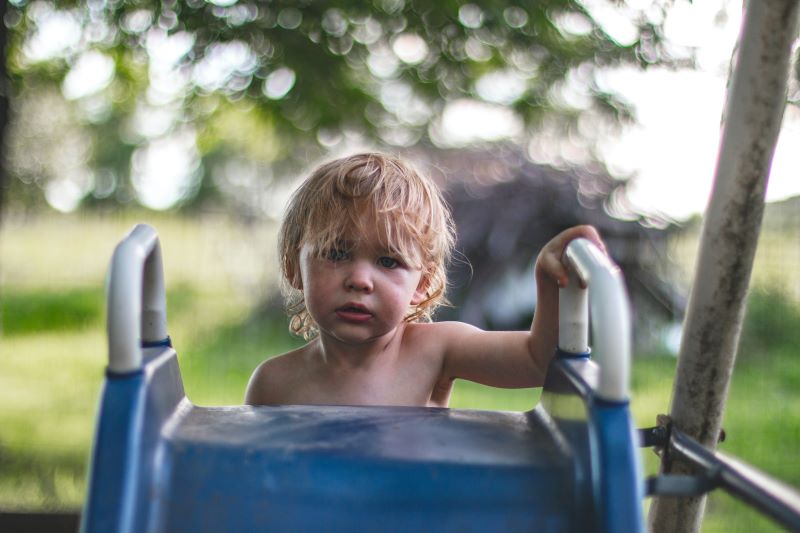
I often deal with a crying child, and I’ve realized it’s because I have a highly sensitive child.
But what does that mean?
Sensitive kids have brains wired to process and react to experiences more deeply. They are empathetic and can be highly reactive to changes in their environment.
Kids often cry when they are overstimulated by sights and sounds. However, highly sensitive kids have bigger reactions to sensory stimuli, including textures and smells. They feel uncomfortable and become overwhelmed more easily.
Sensitive kids also have a low frustration tolerance, so they may get angry, cry, and throw tantrums quickly.
If your sensitive child cries for everything, they may struggle to handle big emotions. This isn’t their fault because their brains are wired to experience emotions more intensely and vividly.
Reasons My Kid Is Crying
- They are in a loud, busy, overwhelming environment
- They don’t want to eat the food you’ve made
- They are upset about something you consider unimportant
- They feel embarrassed
- They are in a new situation
- They’ve lost a game
- They are in a situation where they aren’t in control, or you have enforced a boundary
If any of the above reasons sound familiar, you may have a sensitive child.
How to Support Your Sensitive Child
A screaming child can be challenging to deal with, and they need you to connect with them before you try to correct their behavior.
Self-Esteem
Sensitive kids often have a victim mindset. The best way to stop the tears when they are having a pity party is to improve their self-esteem. Praise the effort they put into things and emphasize their strengths.
Positive Discipline
Your child is already hard themselves, so don’t make things harder by adding shame to the mix. Take the time to connect with your child before trying to talk with them about their crying. Do your best to be aware of your tone and body language. Your child will be very attuned to you, and you wouldn’t want to make them feel ashamed or guilty for crying. Guilt and shame are negative emotions that make it harder for you to connect with them.
Calm Down Space
Your child might need a quiet space to calm down and practice self-regulation. They may want you with them or prefer to be alone. Many sensitive kids need help regulating, especially when they are crying and upset.
How To Deal with a Child that Cries for Everything: Responding vs. Reacting
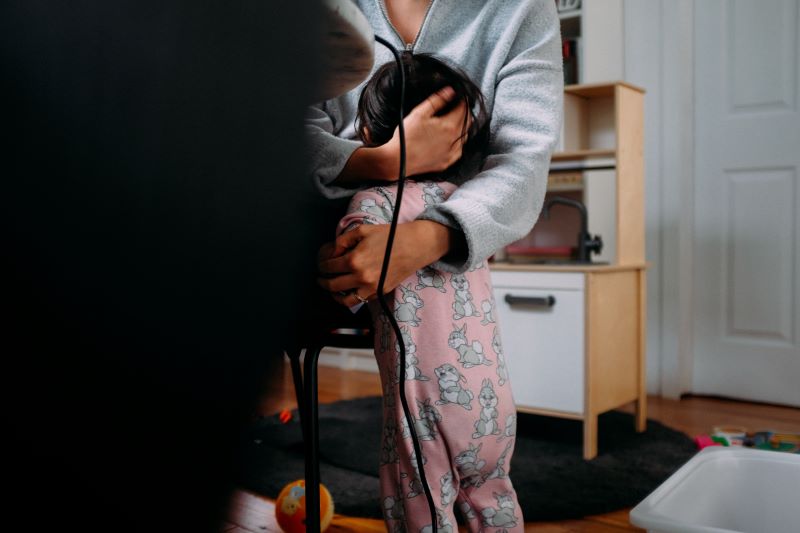
Being responsive is a thoughtful, intentional approach to your child’s crying. Reacting is a knee-jerk impulse that usually comes from an emotion your child’s crying has triggered in you.
Being Responsive
When you respond to your child, it means you are curious and not confrontational about their crying. It’s an empathetic approach that considers your child’s emotions and experiences.
Responding to your child takes a measure of control, and you have to keep a tight reign on your emotions in a situation that can make you feel frustrated and angry.
Being responsive to your child’s crying creates an environment of learning. It lets you focus on positive communication, problem-solving, and emotional regulation.
The next time your child is crying, pause, breathe, and think like a detective. Check if your child is hungry, tired, angry, frustrated, or overstimulated. If none of those things apply, lead with curiosity and empathy. Help your child regulate by being calm, present, and empathetic.
You can mirror their emotions by saying something like, “You are feeling (insert emotion).” They may agree with you, or they will correct you and explain how they are actually feeling. Either way, you demonstrate empathy and understanding, which increases connection in a tense moment.
Being Reactive
When you react to your child’s crying, it is an automatic and impulsive response. Reactivity stems from your emotions and usually comes with feelings of anger and stress.
Have you ever felt guilty after a tense interaction with your child? If you have, you probably reacted rather than responded to their behavior.
Reactivity is less intentional than responsiveness. When you react, you deal with the immediate triggering behavior but don’t get to the root cause of the internal dysregulation causing it.
Reacting in anger can damage the bond you have with your child.
Teach Your Child About Emotions
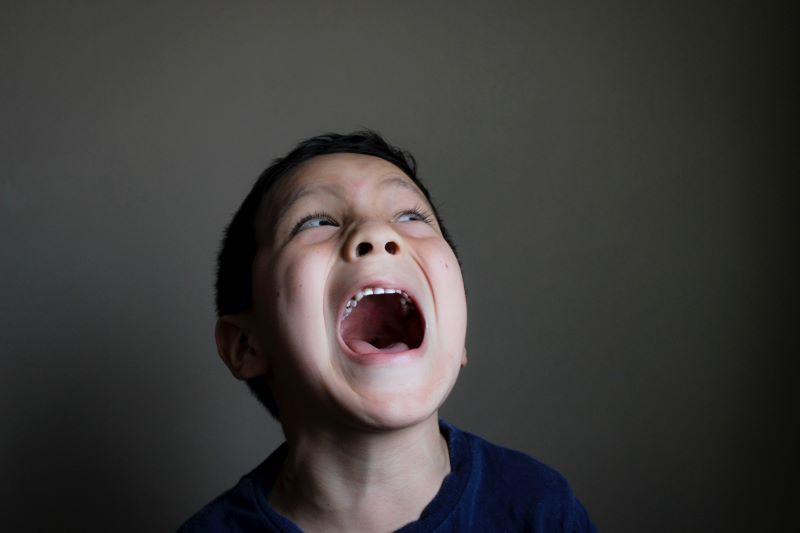
Emotional regulation is one of the most valuable skills you can give your kids. Crying is an emotional response that, although frustrating, shouldn’t be vilified.
Kids feel deeply because they don’t have the skills to moderate their emotions. A sandwich cut the wrong way can elicit the same intense reaction as you enforcing a boundary.
But helping your child understand emotions and giving them an emotional vocabulary to use in challenging times can be a big help.
For example, my son would internalize his feelings until he couldn’t handle them anymore. The warning sign for me was his constant crying for everything, culminating in a spectacular meltdown.
When I asked him how he was feeling, he answered, “I don’t know.” It wasn’t until I introduced a Feeling Wheel and started talking about emotions in everyday scenarios that he started expressing his feelings more readily.
Try these posters to help them explain their emotions.
Crying Isn’t a Bad Thing
Did you know that crying actually has health benefits?
Crying is a natural, usually uncontrolled, response to emotions that, when repressed, can be bad for our health.
You cry three types of tears: reflex, continuous, and emotional. Reflex and continuous tears are 98% water and are mainly used to clean your eyes. But emotional tears help flush stress hormones and toxins from the body.
Researchers have also found that crying is a self-soothing mechanism that helps reset the nervous system, essentially helping the body find emotional homeostasis.
Crying is Communication
Learning how to deal with a child that cries over everything is challenging and requires patience, empathy, and love. But most crying stems from emotions your child is struggling to cope with. The best way to deal with crying is to equip your child with the emotional regulation tools they need to develop resiliency.
We would love to hear your thoughts if you have a child who cries for everything. What resonated with you the most? Share your insights, experiences, or questions in the comments below.
Like this post? Click on the image below to share it on Pinterest! – Thank you!
